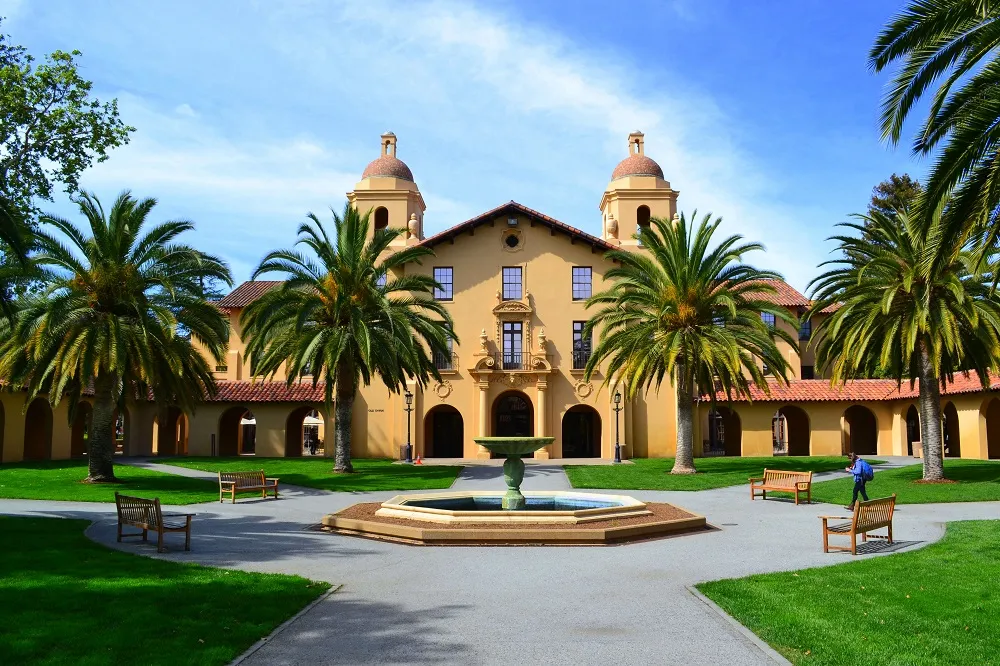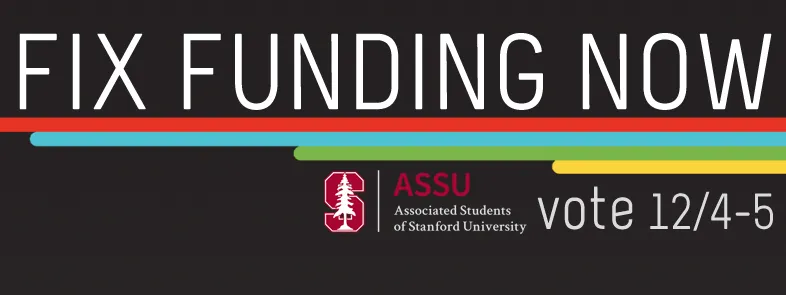Table of Contents

Every week The Stanford Daily writes a news piece covering the content of the ASSU Senate’s regular meeting. These were the titles of the articles from my first four meetings as a ASSU Senator: “Senate Discusses SASA, emergency buffer funds”, “ASSU responds to lack of funding for general fees groups”, “Student groups meet with ASSU to discuss spring funding concerns”, “Senate passes bill to … review buffer funds and expenditures”.
If there is one thing that has become abundantly clear to me in my time in student government at Stanford, it is the extent to which our funding system is broken. As a student at Stanford, you are paying over $149 dollars a quarter to the ASSU; that money is then distributed to groups through general and special fees. Summed, the student fees amount to over $2.5 million in yearly revenue in addition to a stagnant $635,000 discretionary buffer fund.
Yet last year we ran out of money.
In fact, to say that we ran out of money would be an oversimplification of the factors and interests that prevented us from funding student groups for a period of time in the spring. What we faced last spring was merely a symptom of a broken funding system – the real problems are significantly more complex and come at a much higher cost to our wider community.
The real problem is that the Senate’s policies concerning special fees and Senate reserves are driving up the student fee unnecessarily — costing you $90 a year.
In addition to the Senate’s reserves, special fees groups have collective reserves of over $1.3 million which has been accumulated over time as a result of unpaid budget line items; yet year after year, these reserves grow as the ASSU and special fees groups continue to ask students to foot their annual operating costs. In fact, the previous Senate found that if we restructured financing rules in order to prevent student groups from hoarding reserves – which they currently do – then we could not only save students $90 dollars a year but also expand our annual budget by over $300,000. As former ASSU President Daniel Ashton said, “We have over $1 million sitting there that is not helping anyone”.
There does exist a far more sensible solution.
The System As It Is
The Senate’s most salient role in our community is its charge to disburse money to student groups. There are two avenues through which the Senate provides funding to groups: general fees and special fees. General fees grant approved student groups up to $7000 in funding from the Senate. For funding over that amount, a Student Group must apply to receive special fees.
Special fees funding is not heavily regulated, and there is no hard upper limit for how much a group can request. In order to receive money through special fees a student group must submit a budget to the Senate. If that budget is approved, then the group must also get between 10-15% of the students to sign its petition.
In principle, this is a fairly democratic system. In reality, people more or less indiscriminately sign whatever petitions put in front of their faces; only 2 of 101 undergraduate special fees requests were rejected in 2012 and 2013, or just under 2% of all requests. In fact, the special fees petitioning system is so indiscriminate that *The Stanford Flipside *decided to request $7000 to buy a Segway as a joke – and succeeded.
Although unused general fees are repossessed semi-regularly, special fees groups are able to save the money they over budget, creating a strong incentive to overestimate cost projections. In fact, student groups collectively have approximately $1.3 million dollars of special fees reserves. Yet the groups continue to request special fees in order to cover their operations, saving the reserves for “emergencies”. In consequence, student groups are asking students to pay out higher and higher sums of money in the form of activities fees – increasing at a rate of 8% per year – as they sit on more and more cash.
The System As It Should Be
Luckily, there is a clear way that we can lower the quarterly student activities fee and increase the amount of money we distribute among student groups. If we spend the $2 million what we currently have stored in reserves on general fees and conventional special fees expenses as well as ban reserves from here on out, then we can increase the amount of money given to student groups by $300,000 while reducing the amount students pay to the ASSU by 20%. Liquidating the reserves will be hugely beneficial to the larger student community.
The notion of holding reserves is contrary to every principle of the Senate’s current funding system. The special fees system was put in place in order to ensure that expenditures are democratic. Students are supposed to opt-in to funding group expenses as presented in approved budget – budgets that do not include reserves. By holding and re-appropriating reserves, student groups are using student funds for endeavors that have not been explicitly accepted by the student body. What is more, the groups with large reserves continue to request special fees funding – claiming that the reserves are for “emergency situations” – which further distorts the funding mechanism.
Moreover, the Senate’s general fees reserve should be liquidated in order to force us into financial discipline. When we ran out of money spring quarter we drew from the buffer fund without consequence. While we spent the majority of every meeting debating whether it was ethical to draw from the buffer fund – which in my estimation was about as complicated an ethical decision as withdrawing money from a checking account – we rejected funding applications from groups that would have otherwise been eligible for general fees under the auspices that we did not have enough money. I believe that the half a million dollar safety net under our appropriations committee is what leads us to situations where we overspend the general fee income. The best way to make sure the Senate stays focused is by using the reserves to drive down the cost of the student activities fee and eliminating the “backup option” thereby forcing the Senate to have hard caps on how much money we spend. Not only would this keep us financially disciplined, but it would also permit us to focus more time on solving campus issues as opposed to discussing funding problems.
This may seem like a clear cut and obvious solution to a bureaucratic problem. With the general well-being of the students in mind – as judged by how much money is demanded from them on quarterly basis and how much money the student group community receives – eliminating reserves is the obvious thing to do. However, it has proven very difficult to persuade groups holding millions of dollars of reserves to relinquish them. When senators unanimously proposed these solutions last year through SAFE reform, groups that held large reserves spoke out against it. The Queer Coalition sent out an e-mail urging its members to vote no, saying, amongst other things, that it would “place our groups in a more precarious position”. What they were referring to was that “Without any QVSOs with reserves, we will be in a sticky situation if we ever need to hold an emergency response to a situation or if our funding is jeopardized”. Trying to hedge against not having students approve your annual budget in this context is the same as the president of the United States coming out against elections in order to hedge against the possibility of being unseated. At least other groups with similar motivations were sufficiently subtle to disguise their dissent as being related to the lack of “accountability” for a new funding board that was written into the reforms proposed last year.
The entire point of the special fees initiative is to allow the students to evaluate and decide what groups they want to give their money to. If the argument against returning reserves is that a group fears that it will not qualify for money in the future, then that group is weighing the very slim (2%) possibility of not being granted special fees against a $90 relief for every single student and $350,000 more for student groups in general.
Student groups should return the money that they don’t spend to the student body. The only reason that special fees groups would have money left over is if they over budgeted, and in that case it is their duty to compensate for their miscalculation. If I ask my friend for $10 to get a coffee and it costs me $1, it is only expected that I return the remaining $9 back to him. I cannot, in good conscience, keep the $9 for a rainy day – it would be a complete violation of the spirit of the exchange.








